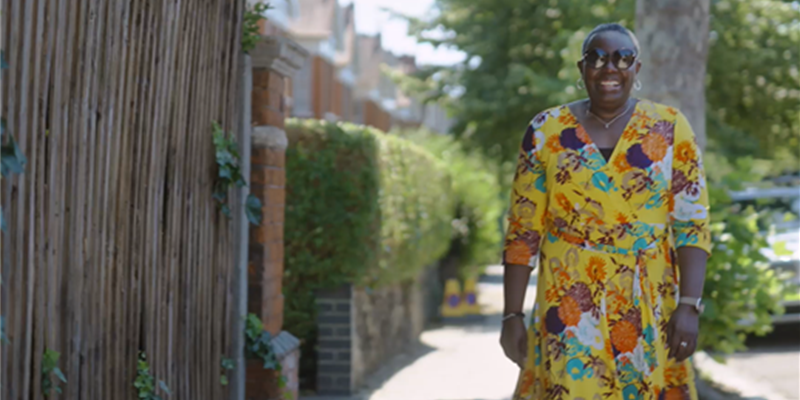
Della talks in her mother tongue, Yorùbá, about her diagnosis, how her family responded and some of the stigmas still prominent in her and her family's community.
This video is part of Macmillan’s mother tongue project. (4 minutes and 22 seconds). We hope to feature different lived experiences here on the Online Community to represent different ethnic cultures and communities so that nobody feels they are facing cancer alone.
Please see an English transcript written below. There are also English subtitles available when watching the video. For additional support information in other languages, scroll to the end of this blog page.
Della: They were wondering where I got this illness from, because “black people don’t get this illness”. It’s seen as a white person’s illness. But things are better now.
My name is Dolapo Ogunleye. I got myself checked for breast cancer in 2010. I was told I had breast cancer but I was surprised they were talking to me, as this disease is usually associated with white people.
When I was told I have breast cancer, my mum came to the UK for a holiday. When I told my mum, she was very scared. She said breast cancer kills. We didn’t know much about it then, it was ten years ago. But I told my mum not to be scared, and that things are getting better and it can be treated. “Don’t be scared.” When my mum came, I felt she was going to stay with me, to help me with chemo, but my mum was scared to come with me so my friend came with me to get chemotherapy.
Everyone was scared to come with me. My siblings and family in general were shocked and asking, “Where did you get it? Where did you get it?” It’s a shock so it’s like “Where did you get it? Where did you get it?”. And I couldn’t answer, I told them I don’t know. I was surprised and I couldn’t say. They prayed for me.
They didn’t come to my house because they were scared to catch cancer. People think if they come to me they will catch cancer. So they didn’t come to my house because they were scared to catch cancer. I was just talking to them on the phone.
In Africa, when we hear of breast cancer, the fear makes people think you are going to die. But I don’t let the fear get to me. I went somewhere where I could get support from people who had cancer before. People that make up a support group. I think, “you survived then I will survive”. But we mustn’t be scared. We have to talk when we feel it, because if we don’t talk then the doctor cannot help.
Please do not keep the pain to yourself. If it’s a headache, a backache, it’s a tummy ache. Quickly speak up and tell the doctor, or else it might spread all over the body. If it does, then it becomes difficult to heal.
If you are told you have cancer, please go and get help from someone that can help, people like Macmillan, they will help you.
Don’t be scared. Go and get help. There’s help, you don’t have to die. It’s bad but it’s not the end of the road. You don’t have to die.
After finding out I had breast cancer, I also then found out I had ovarian cancer. 10 years after finding out I had breast cancer and this time finding out I had ovarian cancer, I began to take care of myself better. I ate well. I went on walks to get a lot of fresh air. I went to the gym to exercise, or to get outside to motivate myself, to eat well.
Don’t be silent. Share your feelings with others, speak out more to let people know what the symptoms were. I was also telling people and showing them that there’s life after cancer. There is life after cancer.
If you’d like to be a guest blogger for the Online Community and share your personal experiences in Macmillan’s Community news blog, please email Community@macmillan.org.uk.
Whatever cancer throws your way, we’re right there with you.
We’re here to provide physical, financial and emotional support.
© Macmillan Cancer Support 2026 © Macmillan Cancer Support, registered charity in England and Wales (261017), Scotland (SC039907) and the Isle of Man (604). Also operating in Northern Ireland. A company limited by guarantee, registered in England and Wales company number 2400969. Isle of Man company number 4694F. Registered office: 3rd Floor, Bronze Building, The Forge, 105 Sumner Street, London, SE1 9HZ. VAT no: 668265007